A Point of View: The all-American drive to legalise marijuana
- Published
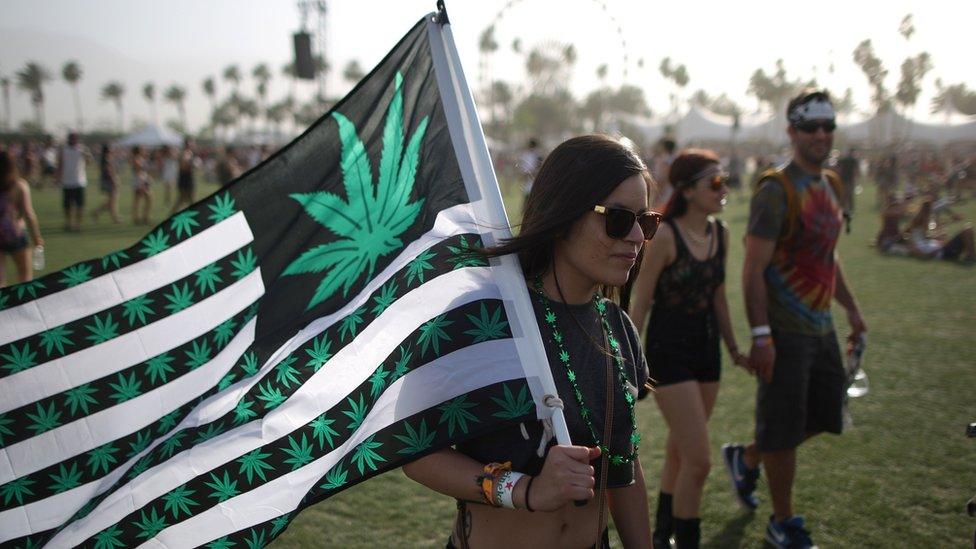
The gradual legalisation of cannabis across US states is a triumph for the American Dream, says Sarah Dunant.
I've recently returned from the west coast of Canada, where a fiery gold autumn was the perfect backdrop for an outpouring of national optimism after the Canadians elected the 43-year-old Liberal leader Justin Trudeau as their prime minster. Greeting voters on the subway next morning, trick-or-treating with his children - the arrival of this dynamic newcomer, sprinkled with dynastic fairy dust, ended almost a decade of Conservative government during which Canada suffered something of an identity crisis. For a country that successfully defined itself as not being the United States, his predecessor's policies on tax, foreign affairs and the environment severely blurred that distinction. As one Vancouverite put it: "I used to make a point of saying I was Canadian, not American, when I travelled. In recent years I haven't bothered."
But if Trudeau is to make his mark by being different, there's one area where he'll be learning by example from the US, or at least a handful of them. His election platform included legalisation of marijuana for recreational use (it's legal for medical purposes now), which means that he and his policy makers will be busy studying Washington State, Oregon and Colorado, all of which have done so already.
In the fraught international conversation about drugs, there's one thing everyone agrees on, though some politicians might close the door before they say it - 50 years of war hasn't worked. Instead it has produced international crime syndicates, financed terrorism, destabilised governments of the countries that produce the drugs and clogged up the justice system and prisons of those that consume them. When it comes to cannabis some of the loudest critics of the law are law enforcers themselves. As an ex-chief of police in Vancouver said in a recent CBC documentary: "The only thing prohibition achieves is putting revenue into organised crime."
It's taken more than plain-speaking police chiefs to bring about the change in the US. Admittedly Oregon, Washington and Colorado are liberal-leaning states, but the underlying social and political forces that moved them towards legislation also exist in the rest of the country. To understand them you have to go back to those much-quoted words from the Declaration of Independence: "The inalienable right to life, liberty and the pursuit of happiness." To which one might add - not even that cynically - "...and profit".
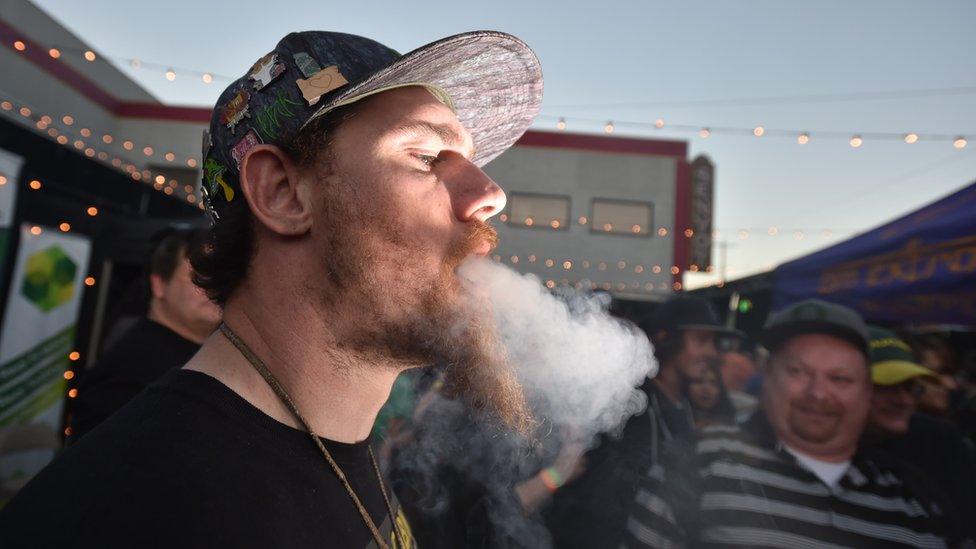
First happiness. During a book tour in 2010, I visited Colorado just after the state granted commercial licences to grow cannabis for medical purposes. In the town of Boulder I met a friend of a friend who had set up a warehouse factory. Sitting together at the bar, I ordered a cocktail, while he had water. "'Fraid I over-medicated last night," he explained with a wry smile. I remember I laughed out loud. Over-medicated. It was the first time I'd ever heard the term. It wouldn't be the last.

Risks associated with cannabis
It affects the ability to drive - a French study found that drivers who had been using cannabis were more than twice as likely to cause a fatal car crash
If smoked, cannabis can be harmful to the lungs; like tobacco, it contains cancer-causing chemicals (carcinogens) that increase the risk of lung cancer, and it can also make asthma worse
Cannabis can harm mental health - regular use is associated with an increased risk of developing a psychotic illness, such as schizophrenia, and the risk is higher if you start using cannabis in your teens and if you have a family history of mental illness
Cannabis may affect fertility, and if you're pregnant, cannabis may harm your unborn baby

To medicate - take some kind of drug to make oneself feel better. As befits a country with private health care, legal pharmaceuticals are mega-business in the US. While mind-altering substances have been around throughout history, on the journey from pain to pleasure the US has played a starring role. She was the first country to successfully use analgesics in an operation (Boston in the 1840s, when under ether a man had a tumour cut out of his neck). One hundred and fifty years later she was also was the first to embrace Prozac. As physical agony diminished, we could start to address mental and emotional suffering, often equally disabling. Life was a crapshoot - depressive DNA, the slings and arrows of outrageous fortune, rising poverty and the ever-accelerating pace and toxicity of modern life. It's no surprise if we need a little mental massaging at times. If there is a drug to address depression or anxiety, to make one happier, why on earth not take it? To medicate. As soon as the word became aligned to cannabis it heralded a subtle but powerful shift in moving the drug out of the darkness of illegality into the light, first of the doctor's office and the dispensary, and then into the brighter surroundings of retail therapy.
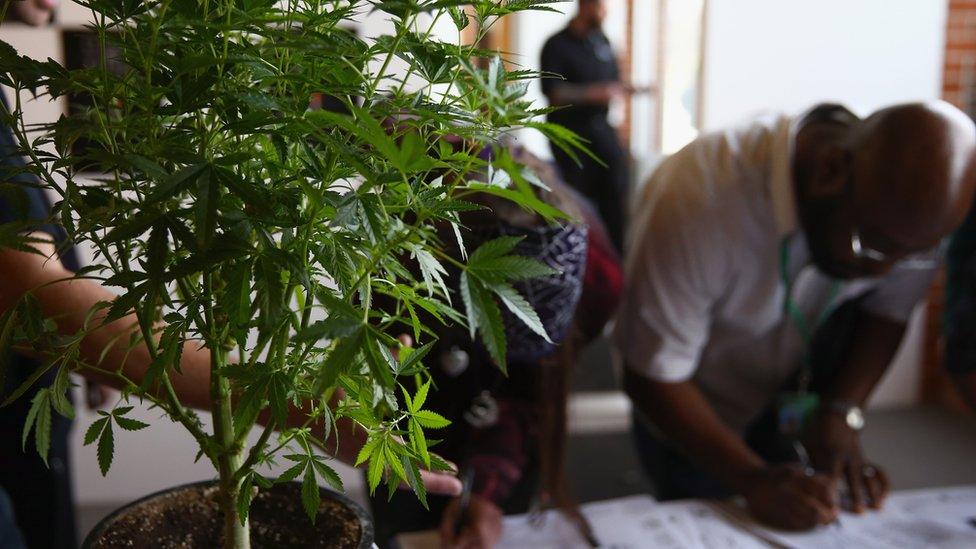
A man fills out a job application at Colorado's first cannabis job fair
Enter profit. Colorado, where cannabis has been legal for almost two years, is the site of a modern gold rush - a late flowering of the American dream. A whole new industry, mixing horticulture and science, run by energetic young entrepreneurs (everyone is a business graduate these days) is out to make a killing through investment and hard work.
As with all start-ups, market lore prevails. Lore and language. No more Cheech-and-Chongs with reefers and doobies. Instead, company directors talk of "exciting new user demographics" and "the high-end luxury consumer package good" and that most magic consumer word of all - choice. The little bag of weed or lump of hash changing hands on the street has grown into a shop wall of dozens of varieties, quantities and strengths. There are tinctures and oils, patches and lotions, infused tooth-picks. But the big commercial breakthrough has been the edibles market - snacks, candy bars, mints, bread, ice cream and beverages, from cannabis cola to latte. Professional chefs cook marijuana dinners and out-of-state visitors take cannabis tours, factory-to-tasting, one ending in a painting class to show enhanced - or at least less repressed - creativity.
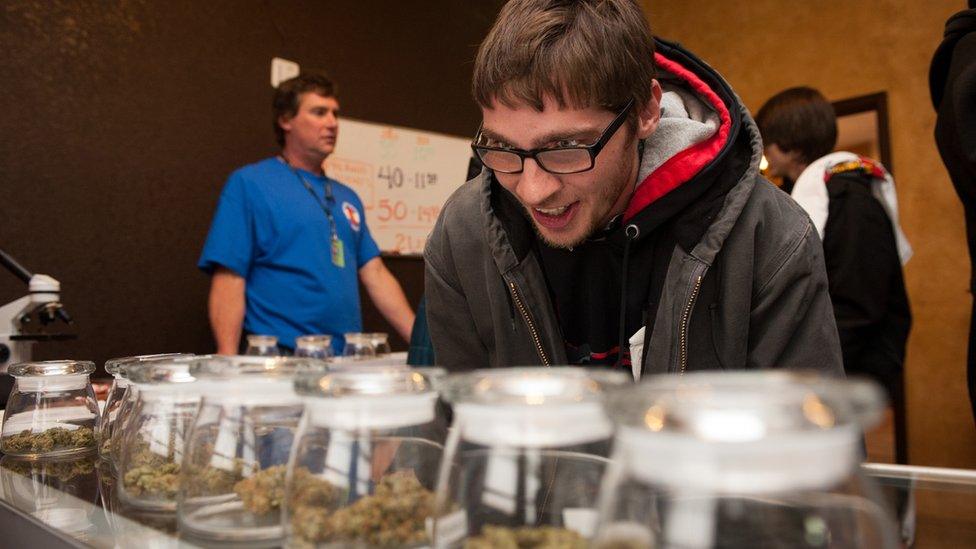
Cannabis use is becoming a matter of consumer choice in the US state of Colorado
Jobs created, profits flowing and taxes rolling. Of course there are regulations. As with alcohol you have be to 21 to buy and have the ID to prove it. You can only get an ounce at a time and there's no smoking in public, though I doubt police officers check takeaway latte on the street. Other rules are stranger. Armoured trucks transfer bags of tax money (it's a strictly cash-only business) to the appropriate government building because banks, operating under federal law, can't touch drug money. This year's tax revenue is estimated at $97m (£64m) - a welcome addition to an economy struggling out of a recession.
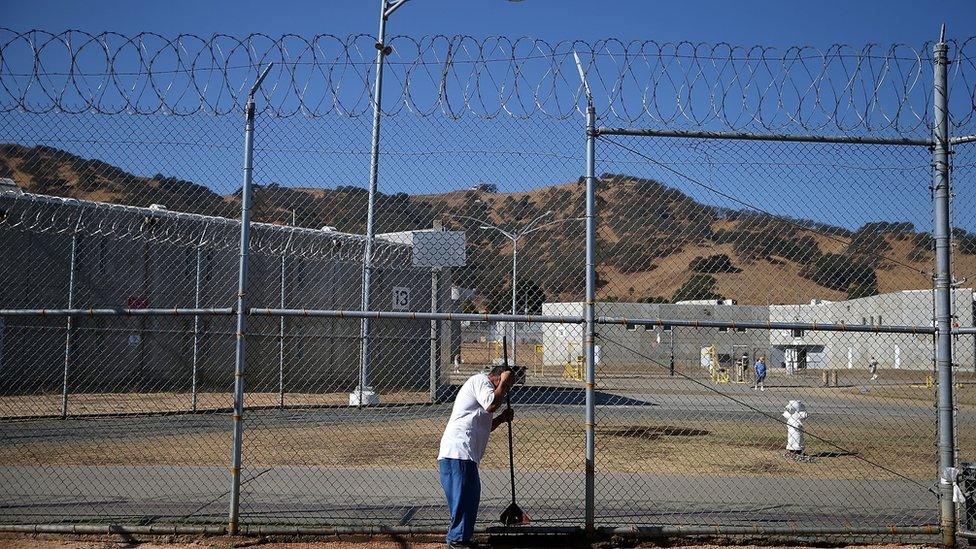
The legalisation of cannabis may have an impact on the US's prison population
With more states voting on the issue every year, the legislation of cannabis, like gay marriage, appears to be gaining political traction. There is also pressure from another direction. The US is panicking about its prison population. At present it incarcerates more of its citizens per capita than any other country bar the Seychelles. At last count 51% of all inmates in federal prisons were in for drug-related crimes and 27% of those for non-violent ones concerning marijuana. Only this month President Obama released 6,000 prisoners, the result of a retroactive sentencing bill, reducing penalties for drug offences in the future.
The message is clear. It costs society too much, in all senses, to criminalise so many people - and disproportionately young black or Latino men - for doing something which, legalised, could create jobs and help balance the budget. Imagine a chain of coffee shops all staffed by retrained biker baristas? The image makes one stoned already.
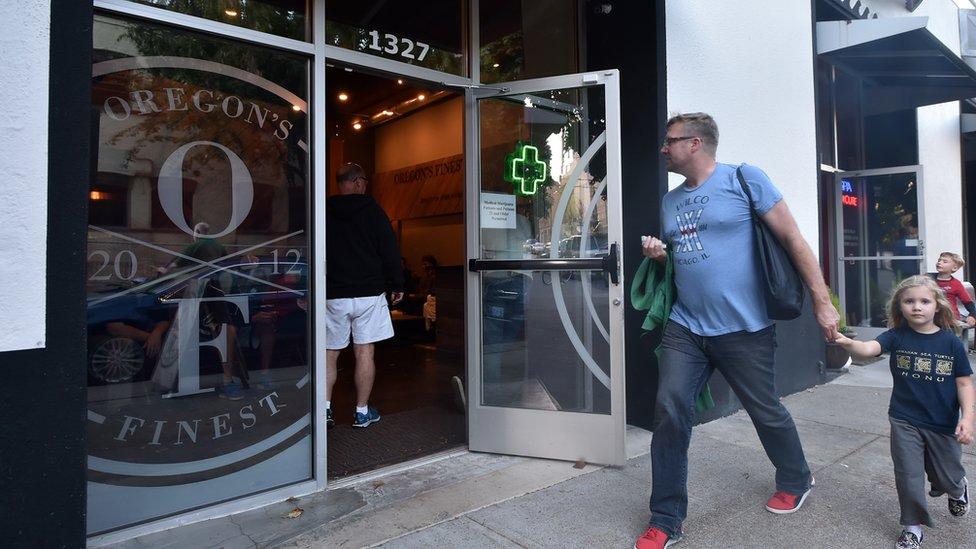
Marijuana dispensaries have now moved onto the high street of states such as Oregon
This is probably the moment for full and frank disclosure. Legalisation of marijuana interests me not only because I'm an observer of political and social change but because I've been using it on and off for 40 years. Throughout my adult life it has relaxed and invigorated me, enriched my friendships, peopled my solitude, rendered me helpless with laughter and, when writing, oiled the hinges on the doors of perception. Though I agree that enhanced strains - particularly when taken by teenagers - can be dangerous, in my experience it's a manifestly less dangerous drug than tobacco or alcohol, and regulated in terms of age of consumption and quality would be even safer.
When all us self-indulgent hippies sat lighting up at rock festivals dreaming of a brave new world, legalising pot was only one of many changes we envisaged (the end of the Vietnam war along with sexual and racial equality were also on the agenda, though no-one remembers such things now because our houses have gone up so much in price).
However, be careful what you wish for. Faced with the prospect that in my lifetime I could be shopping in cannabis stores, confronted with the same mind-numbing choice as say shampoo or yoghurt, with two for one offers, or early-bird discount on names such as Kool Aid Kush, Jack Flash and Blue Dream sold by cheery assistants urging me to have a good day - I find myself, well, less than ecstatic.
Doubtless it's the last vestige of the rebel in me. Perhaps a little radicalism would help. Remember the lottery? That sly tax to fund sport and heritage initiatives. How about using cannabis revenue to top up the NHS? Or help fund higher education?
Now there's an idea that could give an old stoner joy. Or in the new argot, add enhanced pleasure to the process of self-medication.

More from the Magazine
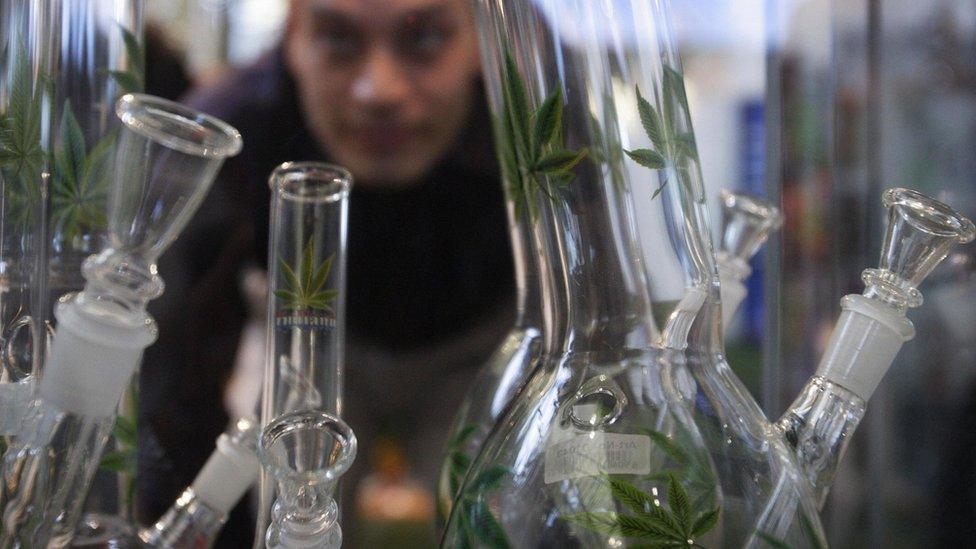
Cannabis is illegal and yet in the UK shops selling cannabis paraphernalia operate openly on the High Street. The "head shop" is an institution that shows no sign of going away.
Cannabis accessories: The strange world of the "head shop" (November 2014)

A selection of your comments
Great article. However, weed is NOT widely embraced in the entire USA. Many see the negative aspects (you did a great job also pointing them out) along with the fact that weed is a gateway drug to harder/more addictive substances. Unfortunately, a great many lives will continue to be destroyed by those who just want to sit on their butts and smoke weed.
Steve D, Florida, US
Sarah Dunant has written an absurd article with nonsensical conclusions. She conflates legalising pot with liberalism and democracy, when, in reality, marijuana is an intoxicant which is both opposed and supported by both sides of the political spectrum. She makes a muddy connection between "pursuit of happiness" and taking drugs, hardly interchangeable concepts. She skirts the many health risks of pot. And she suggests that legalization will lower the prison population, when, in fact, very few convicts are in jail for marijuana; the few that are incarcerated for pot have been convicted for smuggling massive amounts of the drug, not merely smoking a joint.
Jeffrey Zekas, Oregon, US
I too have used cannabis, on and off, for over 40 years. I also work in mental health care and have seen the misery it provokes in those susceptible and their families. Continuing criminalisation makes cannabis a focus of rebellion against the state in those who are probably most at risk - poor and deprived young people. It also enables some of the less savoury elements in society to thrive on the illicit profits.
Maurice, Burton, UK
I agree that the war on drugs has not worked and has only promoted an underworld of crime. However, cannabis and other drugs, do not behave in the body like alcohol and so policing activities such as driving is not at all easy. There must be a quantitative, scientific assessment of a drug's effect before decriminalisation can be possible.
Barry Collins, Bridgend, UK
This is an edited transcript of A Point of View, broadcast on Friday on Radio 4 at 20:50 GMT and repeated on Sunday at 08:50 GMT. Catch up on BBC iPlayer
Subscribe to the BBC News Magazine's email newsletter to get articles sent to your inbox.